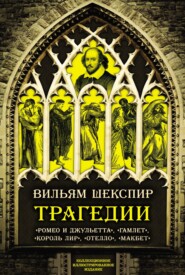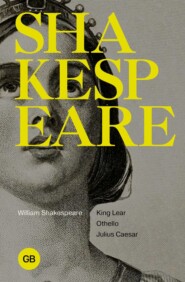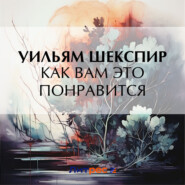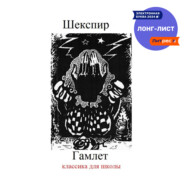По всем вопросам обращайтесь на: info@litportal.ru
(©) 2003-2024.
✖
Beautiful Stories from Shakespeare
Настройки чтения
Размер шрифта
Высота строк
Поля
“Hail, Macbeth, chieftain of Glamis,” said the first woman.
“Hail, Macbeth, chieftain of Cawdor,” said the second woman.
“Hail, Macbeth, King that is to be,” said the third woman.
Then Banquo asked, “What of me?” and the third woman replied, “Thou shalt be the father of kings.”
“Tell me more,” said Macbeth. “By my father’s death I am chieftain of Glamis, but the chieftain of Cawdor lives, and the King lives, and his children live. Speak, I charge you!”
The women replied only by vanishing, as though suddenly mixed with the air.
Banquo and Macbeth knew then that they had been addressed by witches, and were discussing their prophecies when two nobles approached. One of them thanked Macbeth, in the King’s name, for his military services, and the other said, “He bade me call you chieftain of Cawdor.”
Macbeth then learned that the man who had yesterday borne that title was to die for treason, and he could not help thinking, “The third witch called me, ‘King that is to be.’”
“Banquo,” he said, “you see that the witches spoke truth concerning me. Do you not believe, therefore, that your child and grandchild will be kings?”
Banquo frowned. Duncan had two sons, Malcolm and Donalbain, and he deemed it disloyal to hope that his son Fleance should rule Scotland. He told Macbeth that the witches might have intended to tempt them both into villainy by their prophecies concerning the throne. Macbeth, however, thought the prophecy that he should be King too pleasant to keep to himself, and he mentioned it to his wife in a letter.
Lady Macbeth was the grand-daughter of a King of Scotland who had died in defending his crown against the King who preceded Duncan, and by whose order her only brother was slain. To her, Duncan was a reminder of bitter wrongs. Her husband had royal blood in his veins, and when she read his letter, she was determined that he should be King.
When a messenger arrived to inform her that Duncan would pass a night in Macbeth’s castle, she nerved herself for a very base action.
She told Macbeth almost as soon as she saw him that Duncan must spend a sunless morrow. She meant that Duncan must die, and that the dead are blind. “We will speak further,” said Macbeth uneasily, and at night, with his memory full of Duncan’s kind words, he would fain have spared his guest.
“Would you live a coward?” demanded Lady Macbeth, who seems to have thought that morality and cowardice were the same.
“I dare do all that may become a man,” replied Macbeth; “who dare do more is none.”
“Why did you write that letter to me?” she inquired fiercely, and with bitter words she egged him on to murder, and with cunning words she showed him how to do it.
After supper Duncan went to bed, and two grooms were placed on guard at his bedroom door. Lady Macbeth caused them to drink wine till they were stupefied. She then took their daggers and would have killed the King herself if his sleeping face had not looked like her father’s.
Macbeth came later, and found the daggers lying by the grooms; and soon with red hands he appeared before his wife, saying, “Methought I heard a voice cry, ‘Sleep no more! Macbeth destroys the sleeping.’”
“Wash your hands,” said she. “Why did you not leave the daggers by the grooms? Take them back, and smear the grooms with blood.”
“I dare not,” said Macbeth.
His wife dared, and she returned to him with hands red as his own, but a heart less white, she proudly told him, for she scorned his fear.
The murderers heard a knocking, and Macbeth wished it was a knocking which could wake the dead. It was the knocking of Macduff, the chieftain of Fife, who had been told by Duncan to visit him early. Macbeth went to him, and showed him the door of the King’s room.
Macduff entered, and came out again crying, “O horror! horror! horror!”
Macbeth appeared as horror-stricken as Macduff, and pretending that he could not bear to see life in Duncan’s murderers, he slew the two grooms with their own daggers before they could proclaim their innocence.
These murders did not shriek out, and Macbeth was crowned at Scone. One of Duncan’s sons went to Ireland, the other to England. Macbeth was King. But he was discontented. The prophecy concerning Banquo oppressed his mind. If Fleance were to rule, a son of Macbeth would not rule. Macbeth determined, therefore, to murder both Banquo and his son. He hired two ruffians, who slew Banquo one night when he was on his way with Fleance to a banquet which Macbeth was giving to his nobles. Fleance escaped.
Meanwhile Macbeth and his Queen received their guests very graciously, and he expressed a wish for them which has been uttered thousands of times since his day-“Now good digestion wait on appetite, and health on both.”
“We pray your Majesty to sit with us,” said Lennox, a Scotch noble; but ere Macbeth could reply, the ghost of Banquo entered the banqueting hall and sat in Macbeth’s place.
Not noticing the ghost, Macbeth observed that, if Banquo were present, he could say that he had collected under his roof the choicest chivalry of Scotland. Macduff, however, had curtly declined his invitation.
The King was again pressed to take a seat, and Lennox, to whom Banquo’s ghost was invisible, showed him the chair where it sat.
But Macbeth, with his eyes of genius, saw the ghost. He saw it like a form of mist and blood, and he demanded passionately, “Which of you have done this?”
Still none saw the ghost but he, and to the ghost Macbeth said, “Thou canst not say I did it.”
The ghost glided out, and Macbeth was impudent enough to raise a glass of wine “to the general joy of the whole table, and to our dear friend Banquo, whom we miss.”
The toast was drunk as the ghost of Banquo entered for the second time.
“Begone!” cried Macbeth. “You are senseless, mindless! Hide in the earth, thou horrible shadow.”
Again none saw the ghost but he.
“What is it your Majesty sees?” asked one of the nobles.
The Queen dared not permit an answer to be given to this question. She hurriedly begged her guests to quit a sick man who was likely to grow worse if he was obliged to talk.
Macbeth, however, was well enough next day to converse with the witches whose prophecies had so depraved him.
He found them in a cavern on a thunderous day. They were revolving round a cauldron in which were boiling particles of many strange and horrible creatures, and they knew he was coming before he arrived.
“Answer me what I ask you,” said the King.
“Would you rather hear it from us or our masters?” asked the first witch.
“Call them,” replied Macbeth.
Thereupon the witches poured blood into the cauldron and grease into the flame that licked it, and a helmeted head appeared with the visor on, so that Macbeth could only see its eyes.
He was speaking to the head, when the first witch said gravely, “He knows thy thought,” and a voice in the head said, “Macbeth, beware Macduff, the chieftain of Fife.” The head then descended Into the cauldron till it disappeared.
“One word more,” pleaded Macbeth.
“He will not be commanded,” said the first witch, and then a crowned child ascended from the cauldron bearing a tree in his hand The child said-
“Macbeth shall be unconquerable till
The Wood of Birnam climbs Dunsinane Hill.”
“That will never be,” said Macbeth; and he asked to be told if Banquo’s descendants would ever rule Scotland.
The cauldron sank into the earth; music was heard, and a procession of phantom kings filed past Macbeth; behind them was Banquo’s ghost. In each king, Macbeth saw a likeness to Banquo, and he counted eight kings.

















